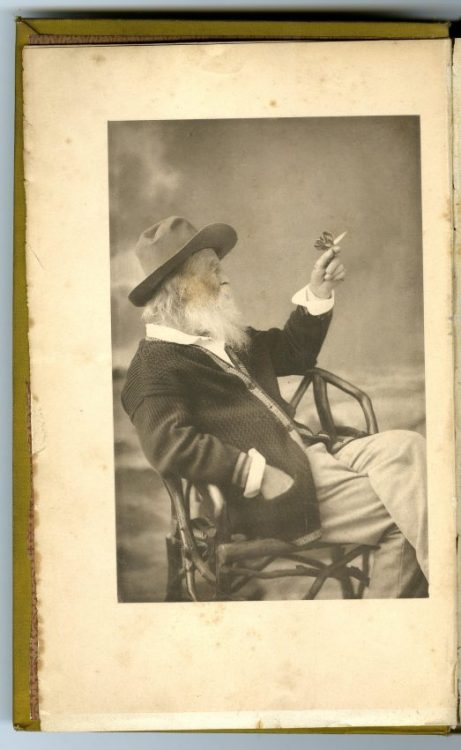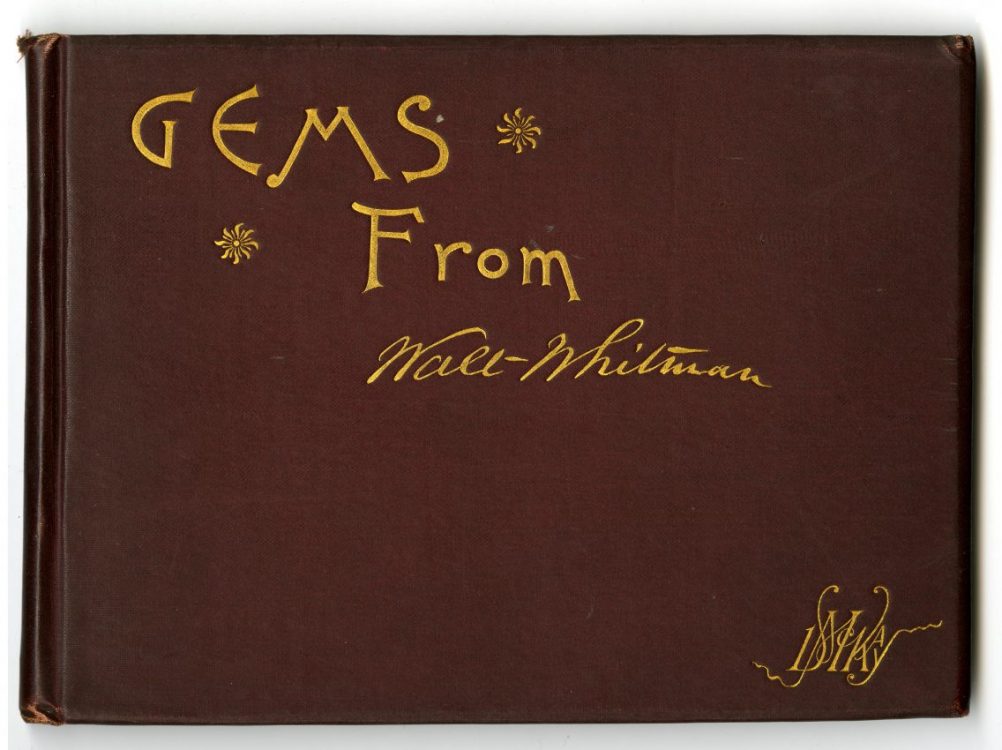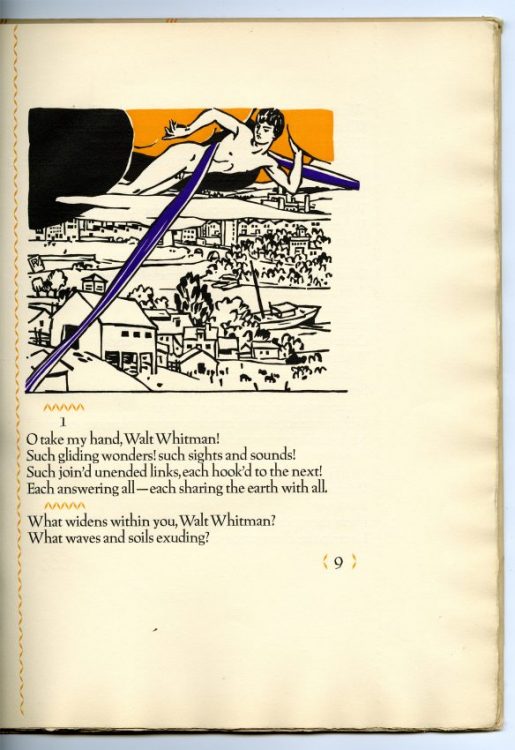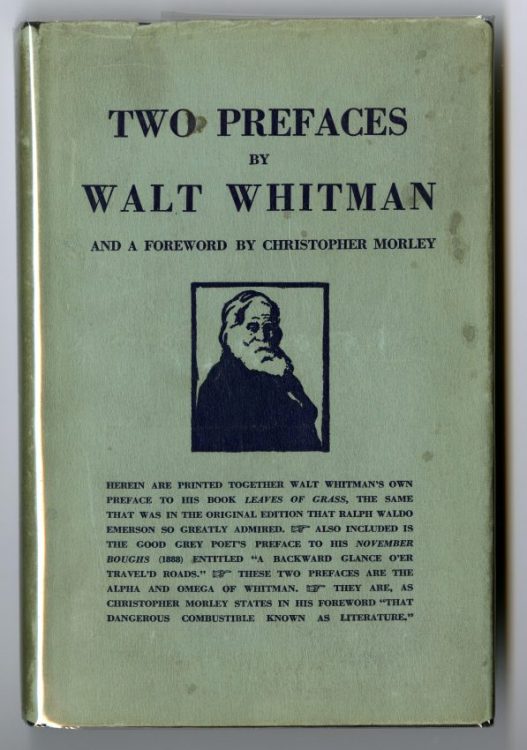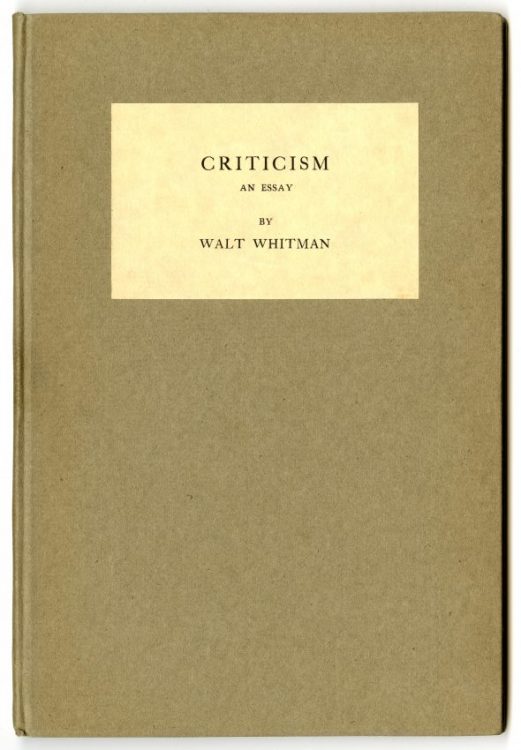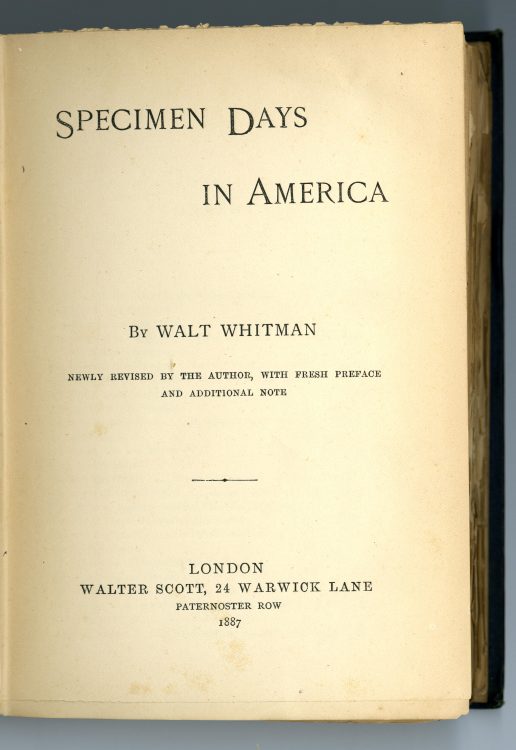Whitman, Walt. Specimen Days and Collect. Glasgow: Wilson and McCormick, 1883.
Arguably the most important work of Whitman's old age, Specimen Days links his life history to national and natural history while presenting itself as the casual reminiscence of a man approaching death. The frontispiece photograph of Whitman holding a cardboard butterfly was taken by the Philadelphia photographer W. Curtis Taylor.
Whitman, Walt, “Poetry To--day in America—Shakspere—The Future,” in Specimen Days: & Collect. Philadelphia: Rees Welsh & Co, 1882.
This essay, written in 1881, is Walt Whitman's most succinct commentary on the evolution of poetry in America. This first printing of Specimen Days bears Whitman’s presentation inscription to the important Philadelphia ornithologist Thomas G. Gentry (1843–1905). Gentry had written Whitman to ask if he could use the poem "The Man-of-War Bird" in an anthology of bird poetry he was preparing, but appears never to have completed.
Whitman, Walt, “Have We a National Literature?” in The North American Review, 152 (March 1891), 332-338.
In this essay Whitman argues that while the United States has produced great authors and works of literature, it must produce literature that reflects the vast geographic and cultural range that comprises America and until this happens America cannot be said to have a true national literature
Whitman, Walt. Gems from Walt Whitman, selected by Elizabeth P. Gould. Philadelphia: David McKay, 1889.
The American author and suffragist Elizabeth P. Gould was a great admirer of Whitman’s poetry. This selection of excerpts from Whitman’s poetry also prints Gould’s poem “To Walt Whitman” and her essay “Walt Whitman Among the Soldiers.”
Whitman, Walt. Salut Au Monde. New York: Random House, 1930.
In "Salut au monde," which first appeared in Leaves of Grass (1856), Walt Whitman presents his vision of the divine origin of human brotherhood and its eventual extension “to all the inhabitants of the earth.” This fine press edition of the poem was printed in Czechoslovakia in an edition of 390 copies, each signed by the artist and type designer Vojtěch Preissig.
Whitman, Walt. Lafayette in Brooklyn. New York: George D. Smith, 1905. Introduction by John Burroughs.
In this brief reminiscence, edited from his original manuscript, Whitman recounts the story of how he was lifted in the air and kissed on the cheek by the Marquis de Lafayette during a celebration in Brooklyn on July 4, 1825.
Whitman, Walt. Two Prefaces. Garden City, N.Y: Doubleday, Page & Co, 1926.
This volume reprints Whitman’s original preface to the 1855 edition of Leaves of Grass along with the preface to one of his last published works, A Backward Glance O’er Travel’d Roads (1888). The American author Christopher Morley has written an introduction to the volume.
Whitman, Walt. Criticism: An Essay. Newark, New Jersey: The Carteret Book Club, 1913.
This previously unpublished essay was found among Whitman’s papers after his death.
Democratic Vistas and Other Papers. London: Walter Scott, 1888.
Whitman, Walt. Democratic Vistas and Other Papers. London: Walter Scott, 1888.
Troubled by the crass materialism and political corruption that marked post-Civil War America, in Democratic Vistas Whitman introduces his own plan for the development of a golden age in the New World.
Whitman, Walt. Specimen Days in America. London: W. Scott, 1887.
This British edition prints Specimen Days separately under Whitman’s proposed title, Specimen Days in America. This first British edition includes eleven additional essays by Whitman on a variety of topics. This copy bears a presentation inscription from Horace Traubel.

